Drinking Culture in Korea: How to Drink Soju 🍶
The Fascinating World of Soju – Master the Art of Korean Drinking Culture!
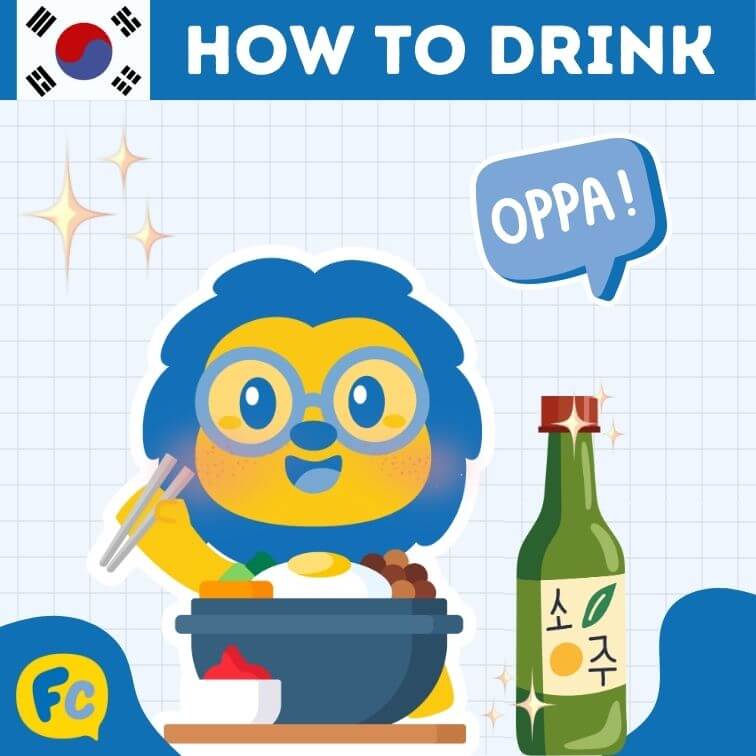
✨Social drinking is more than just a simple night out with friends.
It is a culture that Koreans often find as an opportunity to open up and get connected.
Koreans aren’t shy but somewhat reserved.
Drinking is like an ice-breaker and a great way for even the most shy person to open up.
Let’s uncover the cultural significance and proper etiquette surrounding this popular beverage!
⬇️ Interested in one of the contents below? Clicking on the link will bring you to your preferred section!
How to Drink Soju | Drinking in the Corporate World
How to Drink Soju | Drinking in Family Relationshi
How to Drink Soju | General Drinking Etiquette
How to Drink Soju | Favorite Types Of Alcohol Koreans Love
How to Drink Soju | Best Food For Hangovers
How to Drink Soju | Quiz
How to Drink Soju | FAQ
If you are new to Korean culture, learning about their love for drinking is an interesting subject to pick up.
👉 Why drinking has become a ‘culture’ dates back to the old days. Interestingly, history records alcohol as a health benefit. It is perceived to generate better blood circulation, improve digestion and strengthen muscles.
No wonder Koreans love to drink!
How to Drink Soju | Drinking in the Corporate World
Drinking has always been a part of the Korean corporate culture. If you have worked in a Korean company before, you might have had experience attending 회식 (hoesik), corporate drink gatherings after work. Hoesik is a big deal in Korea and this is where the real business talks are held.
How to Drink Soju | Drinking in Family Relationship
If you meet your in-laws, your father-in-law would most likely want to talk with you over soju. This is to see your drinking etiquette and how well you interact with seniors.

Impressing your in-laws during your gathering is very important. Koreans take drinking seriously so this would be a great chance for you to impress.
How to Drink Soju | General Drinking Etiquette
👉 Here are some drinking etiquette to remember during a 회식 (hoesik), and your meet-up with the in-laws.
No Empty Glass
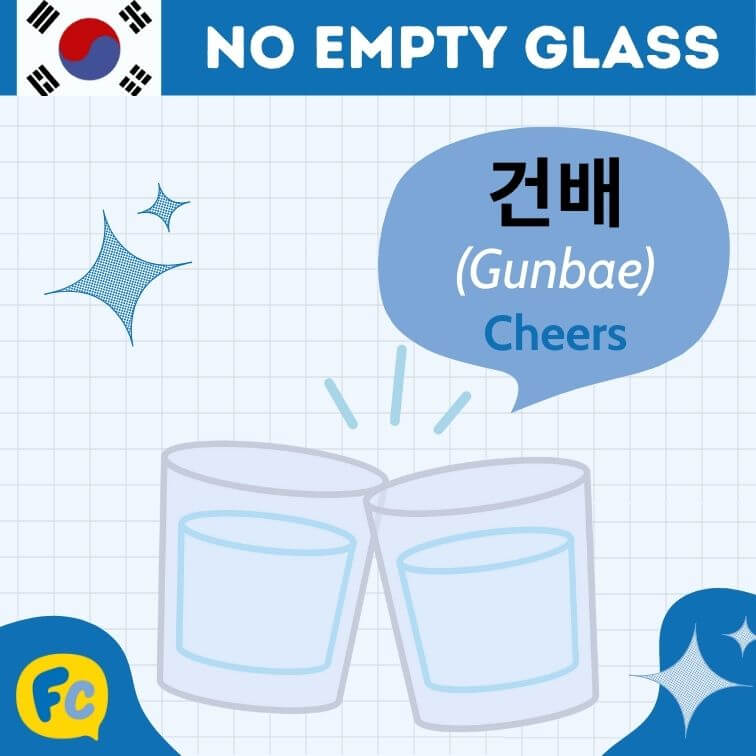
Leaving your glass empty is considered rude in Korea. An empty glass exudes a vibe that you aren’t interested in the gathering.
Make sure it’s always filled and ready to be downed when someone shouts “Gunbae!”.
건배 (Gunbae) means cheers in Korean and is very often said during corporate gatherings.
Don’t serve yourself, wait for others to pour it for you. Actively seek to pour drinks for others.
Koreans don’t only love to drink but love to drink fast. One-shotting is a popular way Koreans enjoy drinking. In Korean, they will repeat 원샷, 원샷, a word that pronounces one shot in English to encourage people to go bottom up.
However, when you are drinking with your in-laws, be cautious.
🍶 Try to suit the style of your in-law’s drinking style before making any attempt. If your in-law prefers an energetic vibe, take the initiatives to pour drinks. If he is more gentle, be discreet and quietly pour his glass when empty and avoid being too loud or shouting 건배 (Gunbae).
Know the Hierarchy
👉 Hierarchy is something I can’t emphasize enough in Korean culture.
If a senior or your superior at work offers to pour a drink, always welcome it with both hands. Always use both hands to receive and pour drinks.
Last but not least, you should turn your head to the side to drink to show respect to seniors or superiors. This is a must in front of your in-laws and should be done with caution during social gatherings.
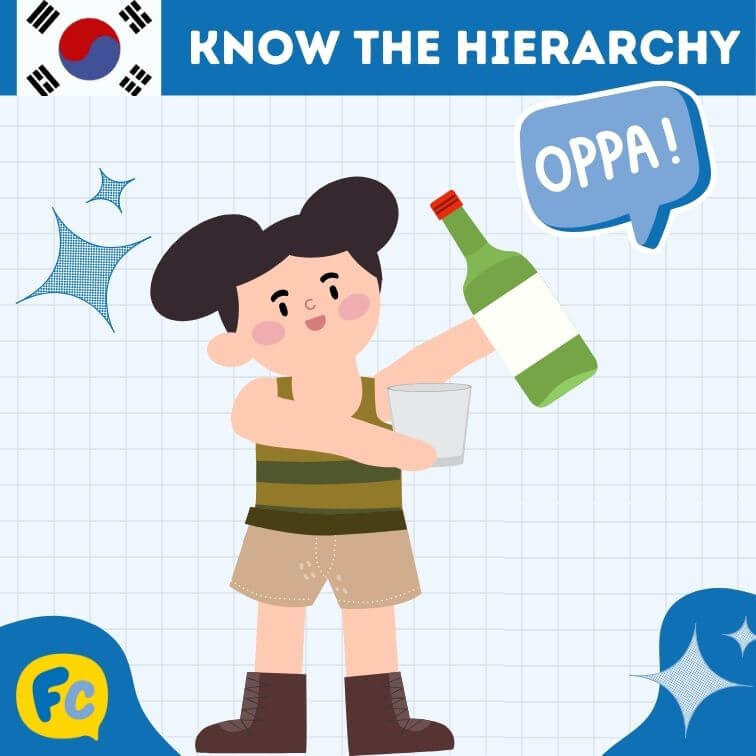
If you have gathered with peers or colleagues, there is no need for head-turning.
But if you are with your superior, respect the hierarchy and drink with your head turned.
Rejecting a drink from someone older than you, or of a higher position at work is considered rude.
Although you might not be a great fan of drinking, don’t reject an offered glass right away!
Instead, discreetly get rid of it,
under the table or moving to another cup.
Favorite Types Of Alcohol Koreans Love
Speaking of drinking, we can’t miss out on the favorite drinks Koreans love.
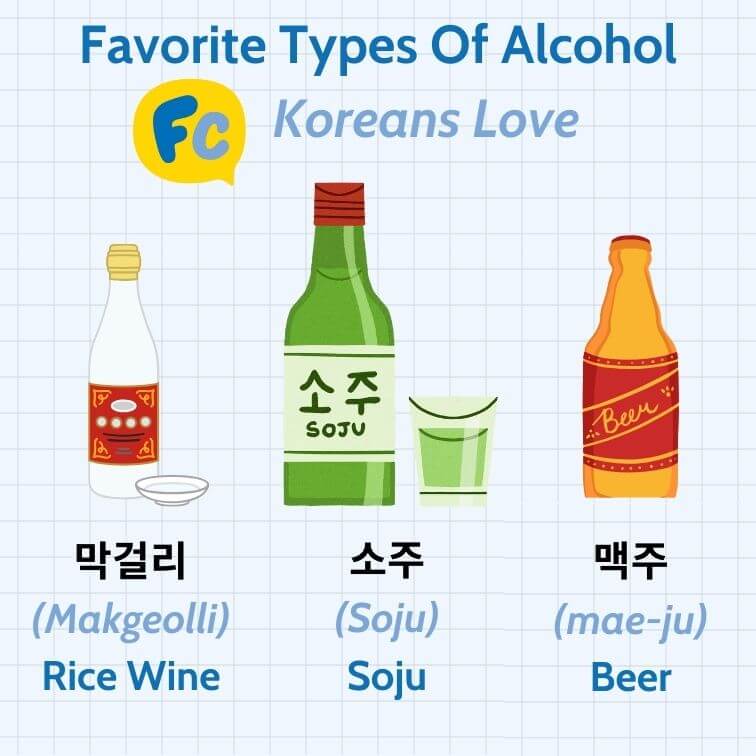
🍶소주 (Soju) – Spirit
소주 Soju is probably the most celebrated drink for Koreans. It’s a spirit similar to vodka made mostly with rice. Soju is paired well with 회 (hwe), a platter of raw fish. Soju is mostly enjoyed neat, straight from the shot glass.
However, younger generations like to do a little mixology with soju, bringing us to our next favorite alcoholic drink.
🍻맥주 (mae-ju) Beer
맥주 (mae-ju) Beer is also a must-drink alcoholic beverage. You’ve probably heard of the word 치맥 (chi-maek) short version of the words 치킨 앤 맥주 (chicken and maek-ju) which is fried chicken and beer.
소맥 (so-maek) is another favorite drink all Koreans know about. It is the short form of 소주 앤 맥주 (soju and maek-ju) which is soju and beer.
Natives sometimes refer it as 폭탄주 (pok-tan-ju) literally translating to bomb shot. It refers to a shot glass of soju dropped into a pint of beer and drank straight down.
🥛 막걸리 (Makgeolli) – Rice Wine
Another favorite alcoholic drink Koreans love to enjoy is 막걸리 (Makgeolli). 막걸리 (Makgeolli) is a traditional Korean rice wine that is sparkly and milky. It has a sweet and somewhat tangy aftertaste. This rice wine pairs very well with 전 (jeon), Korean pancakes.
Best Food For Hangovers
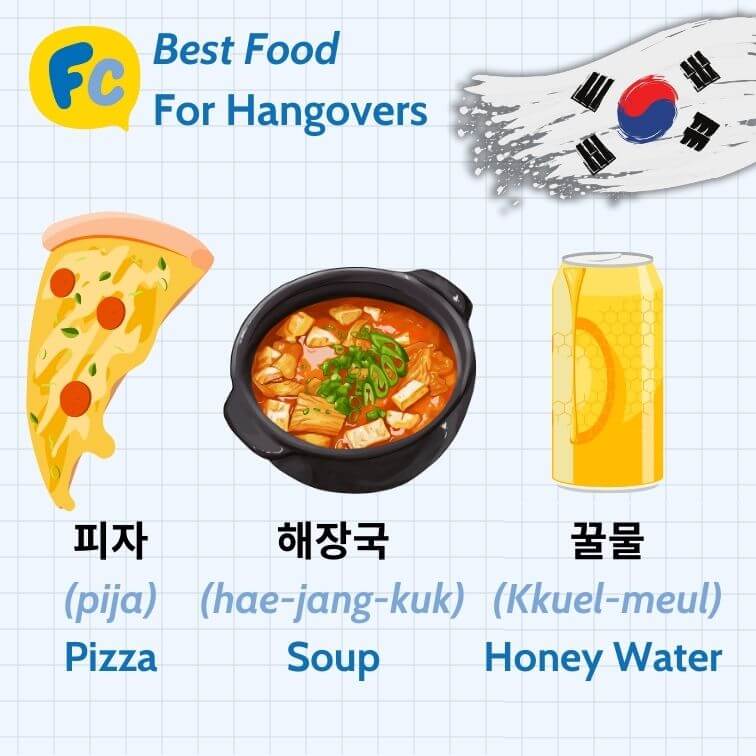
해장국 (hae-jang-kuk) – Hangover Soup
There is a type of soup called 해장국 (hae-jang-kuk) that is specially dedicated to treating hangovers. There are several kinds but usually made in red spicy soup with meat bones and vegetables. Koreans love to take it with warm white rice.
Other soups Koreans love drinking are clear fish or vegetable soups with a kick of spice. A favorite is 북어국 (bu-geo-guk) and 콩나물국 (kong-na-meul-guk). 북어국 (bu-geo-guk) is made with dried pollack fish. 콩나물국 (kong-na-meul-guk) is made with bean sprouts.
Sometimes, they put both ingredients together for richer flavor!
These clear soups aren’t just a hangover soup but also a popular menu for breakfast.
피자 (pizza)
피자 Pizza is another odd yet favorite hangover food. Since you feel dizzy and nauseated, a gulp down oily food helps with the feeling. This is more popular with younger generations as Pizza isn’t a favorite for elders.
꿀물 (Kkuel-meul) Honey Water
꿀물 (Kkuel-meul) This is an old way elders like to treat hangovers. A simple honey mixed in hot water. 꿀 (kkeul) is honey and 물 (meul) is water. The fructose in honey helps neutralize the alcohol in your body.
To Koreans, drinking is a way of fostering deeper conversations and spread 정 (jeong), a uniquely Korean way of affection that can’t be described as just love or friendship. You’ll just need to immerse yourself in the culture to understand the concept of 정 (jeong).
👉 So the next time a Korean asks you if you want to grab a glass, take it as a kind invitation. It could often mean that they want to get to know you better!
👉 BONUS | Interested in other languages too? Why not check out our mega list of 500 Chinese words to learn, the 100 most common Japanese words and the most commonly used words in Vietnamese.

63 Korean Words You Never Knew You Knew!
Did you know you already know loads of Korean words and that’s thanks to the inclusion of Korean Loanwords in the language. Here’s our favourites.
USEFUL VOCABULARY
👇 We should have you pretty well covered with the following vocabulary and phrases:
| Korean | Transliteration | English |
|---|---|---|
| 소주 | soju | Spirit |
| 회식 | hoesik | Corporate drinking gathering |
| 건배 | Gunbae | Cheers |
| 원샷 | won-shat | One shot |
| 맥주 | maek-ju | Beer |
| 치맥 | chi-maek | Chicken and beer |
| 소맥 | so-maek | Soju and beer |
| 폭탄주 | pok-tan-ju | Bomb shot (soju dropped in beer) |
| 막걸리 | makgeolli | Rice wine |
| 해장국 | hae-jang-kuk | Hangover soup |
| 전 | jeon | Korean pancakes |
| 피자 | pizza | Pizza |
| 꿀물 | kkeul-meul | Honey water |
| 정 | jeong | A uniquely Korean concept of affection |
| 위계 | wi-gye | Hierarchy |
| 예절 | ye-jeol | Etiquette |
| 상사 | sangsa | Superior (in a work context) |
| 가족 | gajok | Family |
| 술 | sul | Alcohol |
| 음식 | eumsik | Food |
How to Drink Soju | Quiz
Have you correctly learned the Korean vocabulary on this page?
Have a try right now and get immediate results:
How to Drink Soju | FAQ
What are the rules for drinking Soju in Korea?
When enjoying soju in a social setting in Korea, there are many etiquette rules to pay attention to, including never leave your glass empty and always accept a drink from someone senior to you with both hands.
It’s also considered rude to reject a drink from in-laws or someone senior to you, so it may be better to accept the drink and discreetly get rid of it!
What are some popular drinking games in Korea?
3-6-9 Number Game: Clapping on every 3,6,9 number
눈치게임 (nun-chi-ge-im) Timing Game : The last person to call out and stand loses.
눈치 (nun-chi) refers to the ability to detect other people’s feelings. So as to be quick and stand before the others do!
What is a kind of cocktail Koreans love to drink?
과일 막걸리 (gwa-il makgeolli) – Fruit Rice Wine
The sweet flavors from fruits make this a favorite among ladies.
What kind of food do Koreans avoid for hangovers?
Sweets, like chocolates or cookies
Want More From LTL?
FANCY LEARNING KOREAN? Check out our online Korean courses here.
We offer a 7-day free trial to all online students where you can study Korean 24/7.
Want to study Korean in Korea instead? Our Korean courses in Seoul can either be taken in small groups of no more than 5 students or individually for a more tailored experience.
We even offer incredible homestay experiences in Seoul too.
To top it all off, it certainly doesn’t end with Korean. Check out the other languages we teach 👇🏻










